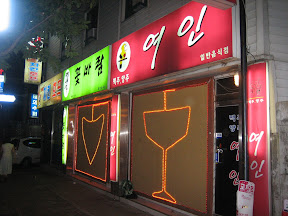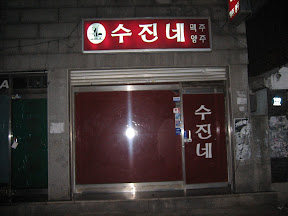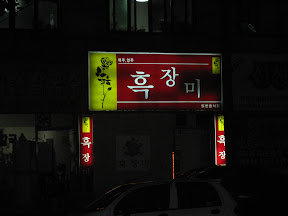But I do.  It's a row of beer and whiskey joints (맥주 양주 점 in Korean). Typically found in lower middle class residential areas, this is a kind of bar where you pay exorbitant amounts of money for beer or whiskey, which you share with hostesses who are typically middle-aged housewives looking for extra cash. You can go ahead and touch them as much as you like. Many of the women will subsequently sell themselves in the shabby by-the-hour hotels which are never more than a drunken stumble away. It's all super classy. One of the major factors driving the industry is the fact that these women need the money to send their children to after school classes. Because the Korean education system is basically in the middle of a death spiral, parents send their children to private classes all day. This is how I make my living. Here's a few more pictures (I've got a bunch):
It's a row of beer and whiskey joints (맥주 양주 점 in Korean). Typically found in lower middle class residential areas, this is a kind of bar where you pay exorbitant amounts of money for beer or whiskey, which you share with hostesses who are typically middle-aged housewives looking for extra cash. You can go ahead and touch them as much as you like. Many of the women will subsequently sell themselves in the shabby by-the-hour hotels which are never more than a drunken stumble away. It's all super classy. One of the major factors driving the industry is the fact that these women need the money to send their children to after school classes. Because the Korean education system is basically in the middle of a death spiral, parents send their children to private classes all day. This is how I make my living. Here's a few more pictures (I've got a bunch):
 This one is called "Amazon", presumably after the one-breasted warrior women who periodically joylessly raped their men-folk and exposed their male babies on the frosty steppes of Eurasia.
This one is called "Amazon", presumably after the one-breasted warrior women who periodically joylessly raped their men-folk and exposed their male babies on the frosty steppes of Eurasia.

 It's a row of beer and whiskey joints (맥주 양주 점 in Korean). Typically found in lower middle class residential areas, this is a kind of bar where you pay exorbitant amounts of money for beer or whiskey, which you share with hostesses who are typically middle-aged housewives looking for extra cash. You can go ahead and touch them as much as you like. Many of the women will subsequently sell themselves in the shabby by-the-hour hotels which are never more than a drunken stumble away. It's all super classy. One of the major factors driving the industry is the fact that these women need the money to send their children to after school classes. Because the Korean education system is basically in the middle of a death spiral, parents send their children to private classes all day. This is how I make my living. Here's a few more pictures (I've got a bunch):
It's a row of beer and whiskey joints (맥주 양주 점 in Korean). Typically found in lower middle class residential areas, this is a kind of bar where you pay exorbitant amounts of money for beer or whiskey, which you share with hostesses who are typically middle-aged housewives looking for extra cash. You can go ahead and touch them as much as you like. Many of the women will subsequently sell themselves in the shabby by-the-hour hotels which are never more than a drunken stumble away. It's all super classy. One of the major factors driving the industry is the fact that these women need the money to send their children to after school classes. Because the Korean education system is basically in the middle of a death spiral, parents send their children to private classes all day. This is how I make my living. Here's a few more pictures (I've got a bunch): This one is called "Amazon", presumably after the one-breasted warrior women who periodically joylessly raped their men-folk and exposed their male babies on the frosty steppes of Eurasia.
This one is called "Amazon", presumably after the one-breasted warrior women who periodically joylessly raped their men-folk and exposed their male babies on the frosty steppes of Eurasia.
This one's called "Sujin's Place". 'Sujin' is the Korean name equivalent of 'Brandy' or 'Trixie', I suppose.
 Here's "The Black Rose". This is where you can fondle middle-aged Korean Suicide Girls.
Here's "The Black Rose". This is where you can fondle middle-aged Korean Suicide Girls. Incidentally, all these pictures were taken within a two minute walk of my parent-in-law's house. Not that they live in a bad neighborhood. Korea didn't use to be too big on zoning laws, so in these older neighborhoods you've got residential buildings, stores, placed of prostitution and manufacturing facilities smooshed together in a sort of harmony that wouldn't be very nice to listen to. What is the reaction of the typical Korean to the preponderance of prostitution in their neighborhoods? Willful ignorance. They totally ignore the bars' presence, like they're not even there.
I think we Americans could learn something from that.
